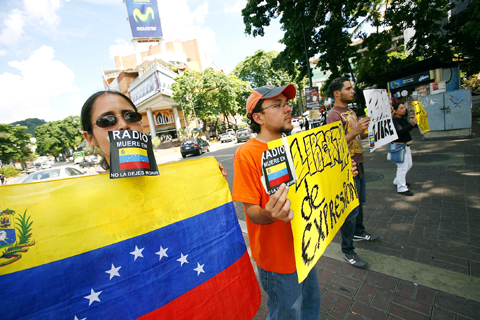Armed protesters stormed the Caracas headquarters of a television station critical of Venezuelan President Hugo Chavez’s government on Monday, one of the channel’s managers said, as 34 radio stations faced closure.
Globovision’s Maria Fernanda Flores said around 30 people arrived at the outlet’s headquarters by car and aimed guns at security staff, forcing their way into the building — where they activated two teargas canisters.
One municipal policeman, charged with guarding the building, and some private guards were hurt during the attack, the station said.

PHOTO: EPA
“We cannot tolerate that violence would be an instrument though which we resolve our differences,” Flores said.
Station manager Alberto Federico Ravell said he held Chavez responsible for the attack.
“This attack is no longer against freedom of expression, it is against the lives of the people who work here,” he said.
Images from the scene showed flag-carrying demonstrators dressed in military-green T-shirts and red berets standing by as a smoky canister was kicked away by security personnel.
Meanwhile, radio hosts hung their heads as their FM station was forced off the airwaves along with 33 other broadcasters targeted by Chavez’s government in what critics say is a campaign to muzzle his foes.
For the first time in decades, CNB 102.3 FM fell silent over the weekend after Venezuela’s telecommunications regulators revoked some of the 34 stations’ licenses and refused to renew others.
But CNB challenged the government action within hours by starting to transmit programming over the Internet. Sportscaster Juan Carlos Rutilo told his online listeners: “Today freedom of expression is being restricted ... Today you have one less option.”
Media groups and human rights activists note more than 200 other stations are under investigation for allegedly not being properly licensed and accuse Venezuela’s leftist leader of pursuing a widening crackdown to silence dissent.
In a similar step, one of Chavez’s leftist allies, Ecuadorean President Rafael Correa, announced on Monday that “many” radio and TV frequencies will revert to the state over what he called irregularities in their licenses. He gave no specifics.
A majority of the stations affected in Venezuela aired criticisms of the government, though they were not overtly anti-Chavez and much of their programming ranged from US rock to salsa and traditional Venezuelan music.
In the country’s polarized media landscape, CNB took a relatively balanced approach by interviewing pro-Chavez lawmakers while also having opposition politicians among its talk show hosts.
Venezuela still has many private radio stations and newspapers that take a hard line against Chavez and strongly criticize the government through both news reports and commentary. But in the last decade, the government has built a growing coalition of state-run media outlets, and some TV channels once virulently anti-Chavez have toned down their criticism.
Hundreds of Venezuelan protesters gathered outside the CNB radio station over the weekend to express their outrage.
“I feel the country that I knew, where I was raised, is slipping away,” said Alix Villareal, a 43-year-old maid who cried alongside other demonstrators. “I’m sad because little by little they are taking away everything, and nobody does anything.”

CHARGES: The former president, who maintains his innocence, was sentenced to 27 years and three months in prison for a failed coup bid, as well as an assassination plot Far-right former Brazilian president Jair Bolsonaro is running out of options to avoid prison, after judges on Friday rejected his appeal against a 27-year sentence for a botched coup bid. Bolsonaro lost the 2022 elections and was convicted in September for his efforts to prevent Brazlian President Luiz Inacio Lula da Silva from taking power after the polls. Prosecutors said the scheme — which included plans to assassinate Lula and a top Brazilian Supreme Court judge — failed only due to a lack of support from military top brass. A panel of Supreme Court judges weighing Bolsonaro’s appeal all voted to uphold

The latest batch from convicted sex offender Jeffrey Epstein’s e-mails illustrates the extraordinary scope of his contacts with powerful people, ranging from a top Trump adviser to Britain’s ex-prince Andrew. The US House of Representatives is expected to vote this week on trying to force release of evidence gathered on Epstein by law enforcement over the years — including the identities of the men suspected of participating in his alleged sex trafficking ring. However, a slew of e-mails released this week have already opened new windows to the extent of Epstein’s network. These include multiple references to US President Donald

Chinese tech giant Alibaba yesterday denied it helps Beijing target the US, saying that a recent news report was “completely false.” The Financial Times yesterday reported that Alibaba “provides tech support for Chinese military ‘operations’ against [US] targets,” a White House memo provided to the newspaper showed. Alibaba hands customer data, including “IP addresses, WiFi information and payment records,” to Chinese authorities and the Chinese People’s Liberation Army, the report cited the memo as saying. The Financial Times said it could not independently verify the claims, adding that the White House believes the actions threaten US security. An Alibaba Group spokesperson said “the assertions

LEFT AND RIGHT: Battling anti-incumbent, anticommunist sentiment, Jeanette Jara had a precarious lead over far-right Jose Antonio Kast as they look to the Dec. 14 run Leftist candidate Jeannette Jara and far-right leader Jose Antonio Kast are to go head-to-head in Chile’s presidential runoff after topping Sunday’s first round of voting in an election dominated by fears of violent crime. With 99 percent of the results counted, Jara, a 51-year-old communist running on behalf of an eight-party coalition, won 26.85 percent, compared with 23.93 percent for Kast, the Servel electoral service said. The election was dominated by deep concern over a surge in murders, kidnappings and extortion widely blamed on foreign crime gangs. Kast, 59, has vowed to build walls, fences and trenches along Chile’s border with Bolivia to